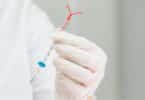
The researchers at the Norwegian Institute of Public Health have found that those moms who suffered from a severe form of morning sickness known as hyperemesis gravidarum before 22 week of gestation are 3 times more likely of passing it on to their daughters.
Morning sickness is usually accompanied by nausea and vomiting and may also lead to weight loss in some cases. The severe kind occurs to about 2% of women which may also lead to hospitalization, low birth weight and higher risk of premature births.
According to lead researcher Ase Vikanes, maternal genes play a very important role in women who have this condition apart from other factors like environmental influences, shared life styles reflected in BMI (body mass index) smoking habits, infections and nutrition.
She also adds that it was earlier believed that the severe case of morning sickness was caused due to psychological issues in women like not accepting the child, but the researchers collected data on 2.3 million births from 1967 to 2006 and found an incredible genetic relation.
In more than 500,000 mother-daughter pairs and almost 400,000 mother-son pairs studied, daughters were 3 per cent more likely to develop the condition in their own pregnancies, compared to 1.1 per cent among women, whose mothers did not suffer from the illness. Female partners of sons whose mothers had suffered from the illness only had 1.2 per cent risk of developing severe morning sickness
Brad Imler, president of the American Pregnancy Association, said that “hyperemesis gravidarum is a serious condition that creates health risks for both the mother and the baby”.
Research into the causes and treatments of this condition are essential for discovering ways to alleviate the condition along with the health risks related to it. But he also cautioned that women need not be over anxious with the news as 3 times raise means the incidence occurring in 3 out of 100 women instead of 1 in 100. He also said that more information was needed like environmental factors, diet, lifestyle that effected the genetic makeup and thus the severity of the condition. – Atula, Staff Writer
Related Articles:
- Girls Combat Stress Better in the Womb, Research Finds
- Woman Gives Birth On Front Lawn
- Additives To Be Banned From Organic Formula
- FDA Issues Recall For Certain Liquid Infant’s & Children’s Tylenol®, Motrin®, Zyrtec®, and Benadryl® products







Very cool info, not that we can do anything about it though. I had MS so damn bad.